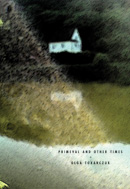
In the heart of Poland lies the village of Primeval; according to Olga Tokarczuk, "Primeval is the place at the centre of the universe." The village is guarded by four archangels, "but like all other things created by God, angels are volatile." Volatility, the constancy of change, is key to Tokarczuk's vision of the world.
Primeval and Other Times, originally published in 1996 and recipient of the Koscielski Foundation Prize in 1997, is the second of Tokarczuk's novels to be translated into English by Antonia Lloyd-Jones. Like House of Day, House of Night (1998, translation 2003), it is constructed in a series of vignettes flashing images of ordinary and extraordinary lives before the reader's eyes. In an interview, Tokarczuk describes her technique: as "sort of MTV videos - short clips."* But her "short clips" have the density and lyricism of prose poems.
The narrative of Primeval and Other Times follows a small group of villagers eighty years through the 20th Century starting in 1914, when Michal Niebieski is conscripted by the Russian army to fight the Germans, leaving behind his pregnant wife, Genowefa. On one level, the novel is a saga of survival through the horrors of wars and occupations, told from the inside out. Each brief chapter of the novel is entitled "In the time of...." one character or another. And the characters include not only the various villagers and occupiers, but a ghost, an angel, a coffee grinder, God, a dog, a game, the mushroom spawn, an orchard, and the Dead. Each person, animal, plant and thing is imbued with its own individual way of knowing the world and interacting with the others.
While the Niebieskis, prosperous proprietors of the village mill, represent the ordinary citizenry with which many of us identify, others in the village embody less familiar characteristics. At the top of the social hierarchy, the Squire becomes obsessed with a solitary cabalistic game as he moves from one World to another - each having a singular vision of God. In the First World, "...there was no God. There was no time or space. There was just light and darkness. And it was perfect." In the Third World, God tried to change animals into people, but the animals revolted and drowned God: "In the Third World, there is no God and no people." On the outskirts of society, Cornspike, the barefoot girl who came from nowhere, takes to whoring to survive, and eventually learns the secrets of the natural world. Even within the Niebieski family, Michal and Genowefa's son Izydor retreats into a hermetic existence.
Trained as a psychologist and inspired by Jungian theory, Tokarczuk writes novels that are at once realistic, mythic, folkloric, poetic and post-modern. The diction of Primeval and Other Times is deceptively flat and seemingly simplistic, like that of a well-known fairytale. But each vignette, each "short clip" adds another layer of perception.
As I was captivated by House of Day, House of Night last year, I was eager to read this new translation of Tokarczuk's earlier novel. I was not disappointed. We can only hope that Antonia Lloyd-Jones will continue to translate the body of Olga Tokarczuk's work to bring it to the English-reading world.
*Interview: http://www.polishwriting.net/index.php?id=39
Download this page as a pdf

Twisted Spoon Press, paperback, 9788086264356